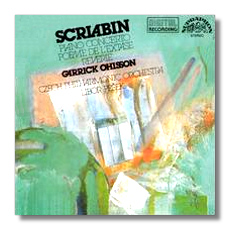
The Internet's Premier Classical Music Source
Related Links
- Scriabin Reviews
- Latest Reviews
- More Reviews
-
By Composer
-
Collections
DVD & Blu-ray
Books
Concert Reviews
Articles/Interviews
Software
Audio
Search Amazon
Recommended Links
Site News
 CD Review
CD Review
Alexander Scriabin

- Symphony #4 "Poem of Ecstasy" Op. 54 (1908)
- Piano Concerto in F Sharp minor, Op. 20 (1897)
- "Rêverie" Op. 24 (1898)
Garrick Ohlsson, piano
Czech Philharmonic Orchestra/Libor Pešek
Supraphon 104149 54min
In the Poem of Ecstasy, the trumpet soloist is both piercing and monotonous. Pešek takes a rather clinical approach to this music, allowing each line to be heard clearly, which rather diminishes the effect of the score's exotic and heavily perfumed colors. In this he's aided by the icy clarity of Supraphon's overly bright early digital sonics (the recording dates from 1985). The strings have a steely quality, and the tutti at 14:46 sounds truly nasty – hardly the Czech Philharmonic of the legendary Vaclav Talich or even Karel Ančerl. Contrasts of tempo and dynamic are violent and sudden, though Pešek does relax in some of the quieter moments. Pešek takes over a minute longer to work his way through the score than Stokowski (from a live concert on Music & Arts), but the old wizard is nonetheless infinitely more seductive, and he's far more sensitive to Scriabin's idiosyncratic palette. Despite the tinny, analog concert recording, the Royal Philharmonic sounds far less harsh than their Czech counterparts on this all digital disc. Moreover, with Stoki on the podium, the orchestra produces an other-worldly sound of incredible richness and beauty. Not only does Stoki's trumpet soloist play with a more mellow tone than Pešek's, he also manages to make each repetition of his signature tune sound utterly fresh and new.
The gorgeous Piano Concerto is an early work, written before the composer found his own distinctive voice. It's a delightful amalgam of Chopin and Tchaikovsky – an unabashedly grand, Romantic concerto filled with glorious melodies and striking contrasts of mood. There are some truly lovely moments in Ohlsson's performance, especially his enchanting dialog with the clarinet in II's first variation. Otherwise this recording is a tepid affair. Ohlsson's tempos are ponderously slow. Ponti on Vox is five minutes quicker overall, and vastly more exciting than his competitor. Moreover, Ohlsson is simply too reserved in the score's most outgoing and dramatic moments. When Scriabin calls for swashbuckling heroics (as he so often does in the outer movements) Ohlsson lets us down, though he can be quite compelling in the score's many poetic episodes. Even then, however, he's no match for Ponti, whose affection for this music is obvious from first to last. As in the Poem, the sound is harsh and the piano has an unpleasant, steely tone. There's far less glare in the old analog Vox recording.
The brief Rêverie was written in 1898, just one year after the concerto, yet it sounds far more characteristic of this composer with its ethereal wind sonorities and chromatic meanderings. The whole work is built on a simple idea stated at the outset by the pianissimo clarinet, and eventually swept up to a passionate climax by the violins. It ends as softly as it began, with cellos solemnly intoning the tune. With all this repetition, the Rêverie is a frankly monotonous affair, though Pešek does his best to bring color and variety to the music.
Given the short program and the harsh digital sound, this disc is no bargain, especially at the full Supraphon price.
Copyright © 1997, Tom Godell


















